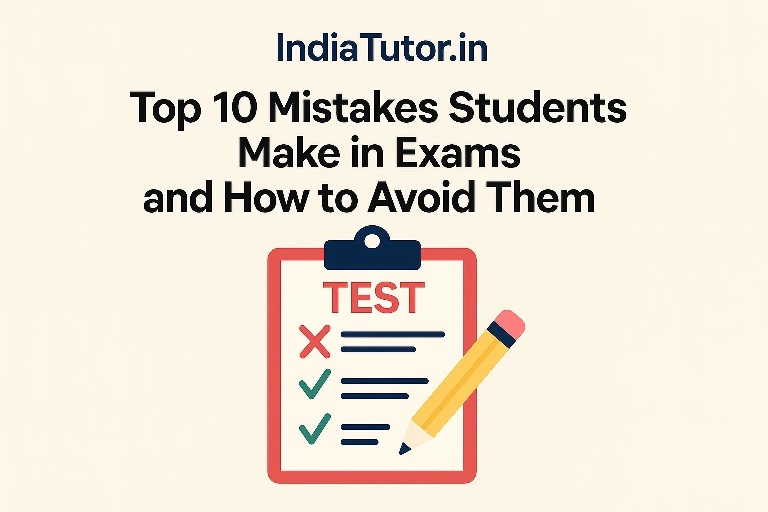Preparing for exams is not just about studying hard, it’s also about avoiding common mistakes that cost students valuable marks. Over the years, I’ve spoken to hundreds of students and teachers across India, and what’s surprising is that most students lose marks not because they don’t know the answers, but because of avoidable mistakes during the exam.
Let’s take a closer look at the top 10 common mistakes students make in exams and how to avoid them.
1. Not Reading the Question Carefully
Many students rush through the question paper without reading it properly. A survey by NCERT found that over 30 percent of students misinterpret at least one question in every major exam. For example, if a question asks you to “explain” and you only “list”, you may lose marks even if your answer is correct.
Tip: Always take a moment to re-read the question before writing your answer.
2. Poor Time Management
Running out of time is a common issue. Many students spend too much time on the first few questions and then rush through the rest.
Tip: Practice mock papers with a timer. Allocate time per section and stick to it during the exam.
3. Ignoring Instructions
Every year, board examiners report that students often ignore instructions such as “attempt any five out of six” and end up attempting all six. This wastes time and effort.
Tip: Follow the instructions given in the question paper carefully to avoid unnecessary errors.
4. Writing Too Much or Too Little
Some students write long, unnecessary paragraphs hoping it will impress the examiner, while others write too little. Both can result in lost marks. CBSE guidelines suggest that concise, to-the-point answers are preferred.
Tip: Stick to the word limit and structure your answer clearly.
5. Not Revising the Answer Sheet
In the rush to complete the paper, many students forget to revise. Spelling mistakes, calculation errors, or missed questions are often discovered during revision.
Tip: Try to finish 10 minutes early so you have time to review your answers.
6. Lack of Presentation Skills
An examiner checks hundreds of papers. A neat and well-structured answer sheet can make a positive difference. According to a report by Cambridge International, students with well-organized answer sheets tend to score better.
Tip: Use headings, underline key points, and write clearly.
7. Studying Without a Plan
Many students try to study everything at once, especially during the last few days before the exam. This causes stress and confusion.
Tip: Use a timetable to cover topics step-by-step. Focus more on understanding than cramming.
8. Not Attempting All Questions
Even if you are unsure of an answer, leaving a question blank guarantees zero marks. You might get partial marks if you attempt it.
Tip: Attempt every question. You have nothing to lose.
9. Getting Nervous or Panicking
Exam anxiety affects performance. Studies show that around 20 percent of students suffer from moderate to severe exam stress, which can lead to blanking out or making silly mistakes.
Tip: Practice breathing exercises, stay positive, and remember that one exam does not define your future.
10. Not Practicing Sample Papers
Many students rely only on textbooks and class notes. But they struggle with the actual paper format.
Tip: Solve previous years’ question papers and sample papers to build confidence and improve speed.
My Thoughts
Scoring well in exams is about smart preparation and avoiding simple yet costly mistakes. As a student, understanding these common errors and learning how to avoid them can make a real difference in your academic journey.
Remember, exams test not just what you know, but how well you can apply it under pressure. So stay calm, prepare smartly, and go in with a strategy.
For more tips, guidance, and free student resources, visit us at IndiaTutor.in.
By Nidhi Mehta, Founder of IndiaTutor.in

